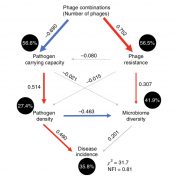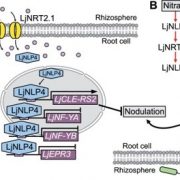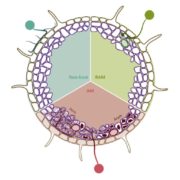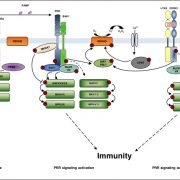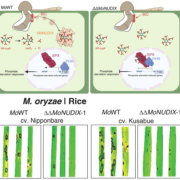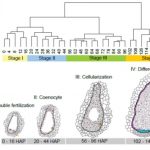Antagonistic responses to ‘symbiotic’ AM fungi in the non-host Arabidopsis thaliana ($) (New Phytol)
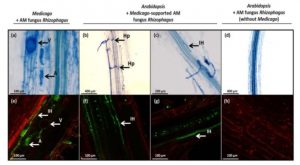 A strikingly vast array of phylogenetically distant plants are able to form intimate interactions with symbiotic arbuscular mycorrhizal (AM) fungi for the mutually beneficial exchange of nutrients. Several years of intensive research have revealed the complex regulatory networks and genetic ‘toolkits’ that enable these interactions, yet comparatively less attention is paid to understanding interactions between AM fungi and non-host plant species. Fernández et al. investigated the molecular responses of Arabidopsis thaliana during non-host interactions with the AM fungus Rhizophagus irregularis. The authors first established that Arabidopsis roots exposed to R. irregularis fungal mycelia upregulate the biosynthesis of the AM-attracting plant hormone strigolactone, similar to AM-supporting host species. This upregulation was not observed when Arabidopsis roots were exposed to beneficial or detrimental species of non-AM fungi, demonstrating that Arabidopsis maintains specific early AM-response programs that evolved to facilitate AM symbiosis. Next, the authors investigated the impact of non-host colonization in Arabidopsis roots using a host species-(Medicago truncatula)-supported AM fungal network. Microscopic analyses demonstrated that Arabidopsis supports early invasive fungal hyphopodea (entrance structures) and intraradical hyphae, although such colonization ultimately resulted in significant reductions in plant biomass. Transcriptome analysis of AM-colonized Arabidopsis roots revealed a strong upregulation of plant defenses, indicative of a robust antagonistic response. Intriguingly, leaves of AM-colonized Arabidopsis plants displayed enhanced resistance to the necrotrophic fungal pathogen Botrytis cinerea, which suggests that antagonistic non-host interactions in roots provides systemic immune benefits. Collectively, these results uncover key similarities and differences in the responses of host and non-host plant species to R. irregularis, suggestive of further complexity in the role of AM fungi in diverse plant communities. (Summary by Phil Carella) New Phytol. 10.1111/nph.15798
A strikingly vast array of phylogenetically distant plants are able to form intimate interactions with symbiotic arbuscular mycorrhizal (AM) fungi for the mutually beneficial exchange of nutrients. Several years of intensive research have revealed the complex regulatory networks and genetic ‘toolkits’ that enable these interactions, yet comparatively less attention is paid to understanding interactions between AM fungi and non-host plant species. Fernández et al. investigated the molecular responses of Arabidopsis thaliana during non-host interactions with the AM fungus Rhizophagus irregularis. The authors first established that Arabidopsis roots exposed to R. irregularis fungal mycelia upregulate the biosynthesis of the AM-attracting plant hormone strigolactone, similar to AM-supporting host species. This upregulation was not observed when Arabidopsis roots were exposed to beneficial or detrimental species of non-AM fungi, demonstrating that Arabidopsis maintains specific early AM-response programs that evolved to facilitate AM symbiosis. Next, the authors investigated the impact of non-host colonization in Arabidopsis roots using a host species-(Medicago truncatula)-supported AM fungal network. Microscopic analyses demonstrated that Arabidopsis supports early invasive fungal hyphopodea (entrance structures) and intraradical hyphae, although such colonization ultimately resulted in significant reductions in plant biomass. Transcriptome analysis of AM-colonized Arabidopsis roots revealed a strong upregulation of plant defenses, indicative of a robust antagonistic response. Intriguingly, leaves of AM-colonized Arabidopsis plants displayed enhanced resistance to the necrotrophic fungal pathogen Botrytis cinerea, which suggests that antagonistic non-host interactions in roots provides systemic immune benefits. Collectively, these results uncover key similarities and differences in the responses of host and non-host plant species to R. irregularis, suggestive of further complexity in the role of AM fungi in diverse plant communities. (Summary by Phil Carella) New Phytol. 10.1111/nph.15798


